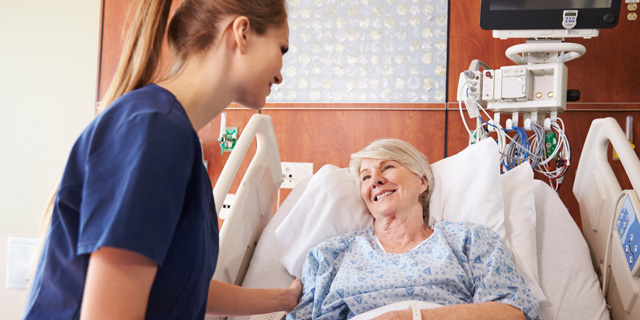Specialist Cancer Nurses: Why they matter
International Nursing Day falls each year on the anniversary of Florence Nightingale’s birth. Although technology may have changed the role of nurses, what they do for cancer care is more important than ever.

Receiving care from a specialist cancer nurse is the most consistent factor in patients saying their treatment experience was a good one.
That was one of the key findings in the 2013, Victorian Comprehensive Cancer Centre Patient Experience Survey (CPES). But it’s the same finding that’s been reported around the world. Year on year in the UK, where they have used the same questionnaire to measure cancer patient experience, the reports are the same. Is this coincidence or is it, as is often reported about nurses, that they are just kind, caring people?
The answer is neither. It’s because nurses who have committed to developing specialist nursing knowledge, as well as a developed expert understanding of cancer biology. They’ve studied he risks and consequences of different drugs on vital body organs and the effects of cancer and its treatments on mental health, cognitive and physical function. They’ve included family dynamics, ability to work, social integration, and financial stability. They can also educate patients and their support networks about the potential side effects of the drugs they are on, the clinical trial they have started; they can help a patient tell their child, parent, sibling or boss they have cancer or sit and ask a patient and their loved ones what they understood about their cancer. They can communicate what needs to happen next, reassure people that their cancer may not be curable but there many, many things that can be done to ensure quality of life, and where possible extend quantity of life. They can take all of this information and develop a plan of care for and with one person, in their unique circumstance. That is a specialist cancer nurse.
Specialist cancer nurses make the difference between living with cancer and living well with cancer. The knowledge, skills and expertise that come through studying at an advanced level, means that people who find themselves faced with one of the most feared and dreaded of all illnesses, have nurses who have the latest research at their fingertips and can help people develop self-care knowledge and strategies to prevent wherever possible, complications of cancer or its treatment.
Specialist cancer nurses are the first line of defence for all patients. A specialist nurse who asks to look inside the mouth of a patient having chemotherapy for leukaemia is concerned about the development or presence of mouth ulcers (a common side effect of chemotherapy for patients with blood cancers). Why, because mouth ulcers can become a pathway for infection throughout the body for people who have very little ability to fight infection once their treatment has started, this can be life threatening. Because mouth ulcers can lead to severe pain that impacts ability to eat, that may lead to weight loss, that can reduce ability to respond fully to treatment and may delay or complicate recovery. Because pain, if left unmanaged, may lead to depression and withdrawal from family and friends which has been shown to impact response to treatment and recovery.
There are many other examples of things that specialist cancer nurses do that seem, at face value, to be simple. This is the essence of specialism. The more expert you are the easier you make things look. Talking to and walking a patient to the bathroom, asking what’s going on in the news, are just some examples of how a skilled nurse assesses balance, condition of a patients’ skin, their ability to stand and walk independently, whether they are oriented to time and place, their emotional wellbeing and motivation to get home, to get back to work, self care, and that may all happen in the space of 5 minutes.
These are the skills of many specialist nurses in aged care, in paediatrics, in renal or cardiac nursing. Excellent nursing requires excellent knowledge. But perhaps at no time in the history of cancer care have specialist cancer nurses been more important for people affected by cancer.
Cancer treatments are changing at an incredible pace. For patients benefitting from the advances in genomic medicine, they deserve nurses who understand and can recognise the risks and benefits of these new agents, as well as help prepare and educate patients and their families, so that the investment in the development of these new drugs are fully realised for the people who need them.
For patients who previously could not benefit from radiation therapy because of the limits of technology but are now able to benefit because of the progress in precision delivery of radiation therapy, or patients who previously could not have surgery because of the extent or location of the cancer, but are now able to have surgery because of advances in surgical robotics, they need and deserve nurses who have advanced understanding of what these treatment opportunities mean for side-effects, symptoms and the health outcomes that matter to patients.
For patients and their support networks, where the diagnosis of a rare or less common cancer brings uncertainty about the hope for cure or long-term control of the disease, patients needs specialist nurses who can assess, anticipate, prevent, manage and treat complex, sometimes multiple interacting symptoms or problems. This requires knowledge of cancer biology, pharmacology, patterns and signs of disease spread, and the physical, emotional, social and spiritual consequences that shape the quality and quantity of life of an individual, and the memories and experiences of those left after the death of a loved one.
People with cancer deserve specialist cancer nurses. Health systems deserve specialist nurses because international evidence shows we make care safer and cheaper.
Professor Meinir Krishnasamy
Chair Of Cancer Nursing